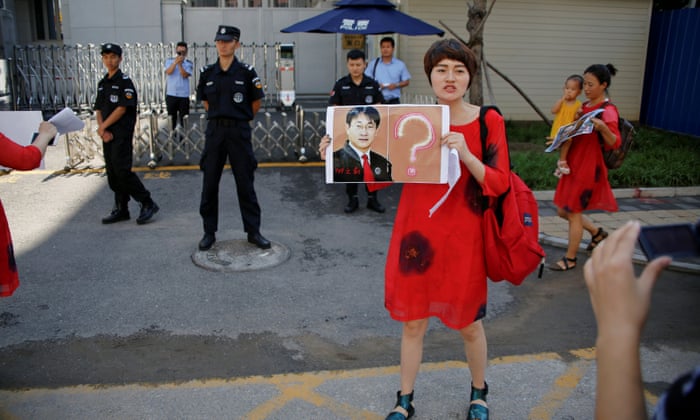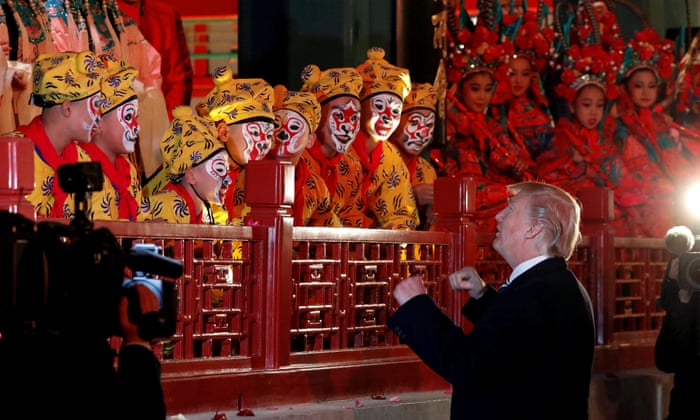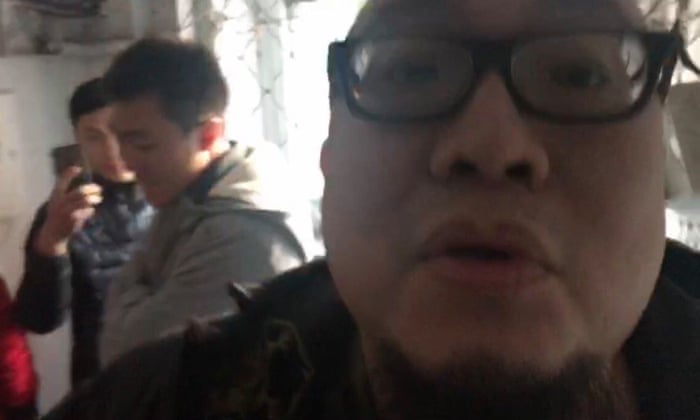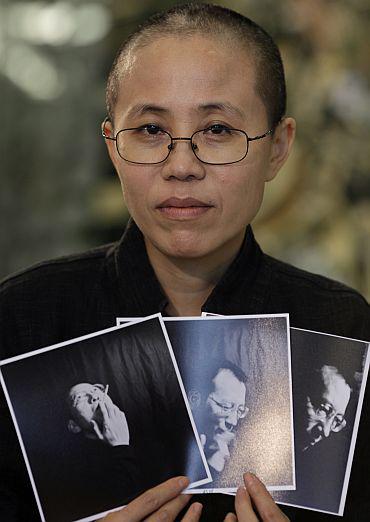China: Families of Interpol Targets Harassed
End Collective Punishment in Pursuit of SuspectsHuman Rights Watch
 Chinese dictator Xi Jinping speaks during the 86th INTERPOL General Assembly at Beijing National Convention Center on September 26, 2017 in Beijing, China.
Chinese dictator Xi Jinping speaks during the 86th INTERPOL General Assembly at Beijing National Convention Center on September 26, 2017 in Beijing, China.
Chinese authorities should immediately stop harassing and detaining family members of suspects living abroad to compel their return to
China, Human Rights Watch said today.
The global police organization Interpol and foreign governments should reject China’s misuse of Interpol’s “red notice” system, which alerts governments to people sought for arrest.
Human Rights Watch interviews with five “red notice” individuals found that the Chinese authorities subjected their family members in China to forms of collective punishment – unlawfully punishing someone for the actions of another.
The authorities have also
pressured relatives to travel to the countries where red notice individuals live to persuade them to return to China.“Chinese authorities have put
all kinds of unlawful pressure on relatives of corruption suspects to get them to return to China,” said
Sophie Richardson, China director at Human Rights Watch.
“There is no legal basis for these traumatizing guilt-by-association tactics.”
China’s wanton mistreatment of relatives of corruption suspects is bad enough, but Interpol and other governments should not be enabling Chinese abuses abroad.
Sophie Richardson
In late 2012, Chinese dictator Xi Jinping launched a purported “war on corruption.”
As part of that campaign, China asked Interpol to issue red notices against individuals living abroad who have been accused of "corruption".
Interpol red notices are alerts seeking the arrest and extradition of wanted people, issued at the request of the government seeking those individuals.
They are not international arrest warrants, however, as Interpol’s member countries can determine what legal action to take in response.
In some countries that do not have extradition treaties with China, Chinese authorities have tried to secure the return of red notice individuals by putting pressure on their family members in China. Official reports often depict the individuals initially refusing to return, but later changing their minds due to “
the deterrent effect of the law, policy appeals, and family influence.”
Human Rights Watch research revealed that
Chinese authorities, using Interpol red notices as a justification, used various means to systematically harass family members of red notice individuals.
Police and prosecutors visited or summoned relatives without presenting any legal documents and threatened to detain them if they failed to convince the red notice individual to return to China.
Human Rights Watch identified at least two cases in which authorities formally arrested relatives.
The police have also barred family members – including spouses, children, parents, and siblings and their families – from traveling outside China.
Children of red notice individuals have been blocked from attending schools abroad.
Authorities have also imposed collective punishments on relatives by freezing their assets, firing them from their positions in government-owned companies, or warning their business partners not to work with them.
Human Rights Watch takes no position on the merits of Interpol red notices discussed below. However, even properly issued red notices would not justify collective punishment of family members.
Authorities in countries in which red notice individuals reside should investigate harassment and other abuses by Chinese officials or their agents against these individuals or their family members.
Authorities in the countries in which they reside should ensure red notice individuals in their countries have adequate protection.
In cases where red notice individuals may be subject to extradition, those authorities should provide them adequate opportunity to contest the extradition, and not return anyone to China if they are likely to face persecution, torture, or ill-treatment there.
Interpol should conduct careful due diligence before processing information provided by the Chinese government and before facilitating information-sharing between the Chinese police and police forces of other countries, Human Rights Watch said.
They should also ensure that fundamental rights of red notice individuals and their family members are protected.
“China’s wanton mistreatment of relatives of corruption suspects is bad enough, but Interpol and other governments should not be enabling Chinese abuses abroad,” Richardson said.
Detention, Threats, and Harassment of Relatives of ‘Red Card’ Individuals
Human Rights Watch interviewed four people based in the United States and one in Canada.
All interviews were conducted in person or by phone.
They are from four provinces and one municipality in China, and all said they are currently on Interpol’s “red notice” list.
Human Rights Watch also spoke to three lawyers who represent clients subjected to red notices.
Three red notice individuals asked to remain anonymous for fear of government reprisal against their families in China.
Human Rights Watch also reviewed dozens of government and media reports on returned red notice individuals, which generally corroborated the accounts of these individuals.
Detention, Threats of Detention
Interviewees told Human Rights Watch that their family members in China were very scared of the government officials who visited them.
They said that police and prosecutors invoked Interpol red notices to justify punishing their family members.
Liang Jianguo (pseudonym), a businessman, said, “Police told my family that the government can take ‘any actions to control’ the relatives of red notice personnel and that they won’t live a normal life [unless I] return to China.”
Zhang Datong (pseudonym) said:
They would call [my wife] first, and say, “We are coming tomorrow morning to your home at 8:30, don’t leave the house.”
Of course, my wife wouldn’t dare to say no… they repeatedly threaten[ed] my wife that if I don’t go back, she would be detained… my wife told me many times that, “You have no idea the mental distress we’re under.”
She is very worried that if she does anything wrong to displease or provoke them, they would not allow our children to go to school.
Zhang said that the police had also harassed his septuagenarian parents: “[My parents] are very scared, too. One time after they talked to my mother, she had to be hospitalized for a month for high blood pressure-related health issues.”
Li Gang, a former businessman in Wuhan, Hubei province, said that his mother showed signs of mental illness after sustained harassment:
When the authorities started to harass my mother, she was 79.
During September and October 2016, it was really intense.
The authorities came to our home about every other day.
At the end of last year, my mother had a stroke and was hospitalized…
My brother told me that [our] mother has been losing her mind.
She would talk to herself, murmuring things like “Ganggang [Li Gang’s nickname], please come back. You will be fine, as long as you sort out the money issues.”
Wang Lihe (pseduonym), a former businessman, said:
They have summoned my siblings countless times, from both the [the name of the prefecture] and the provincial public security bureaus…
Today they summon my sister, tomorrow my brother, the next day my niece, like that…
[The police] would threaten them that if I don’t go back, they would be arrested too.
Liang said:
At the beginning, the police came [to our home] about twice a week; later, two or three times a month.
Every time for one or two hours.
This has been going on for over a year.
They come whenever they want, acting like hooligans.
They threatened my wife, saying that if she doesn’t do what they ask her to do, she would be jailed, and that once she’s jailed, she won’t be able to get out ever.
Liang said police used similar language with other relatives, including his child, a minor: “They are all scared to death. Every time my wife calls me, she cries and cries, begging me to return to China.”
Xie Weidong, a former Supreme People’s Court judge now residing in Canada, said that to compel him to return to China,
authorities detained his sister and his adult son for over a year.
Xie shared with Human Rights Watch documents detailing his case.
The Hubei procuratorate detained Xie Weidong’s sister, Xie Weifang, in September 2016 and his son, Xie Cangqiong, in December 2016 in Beijing, where they were living, and took them to Hubei province.
Prosecutors charged Xie Weifang with taking bribes, and accused Xie Cangqiong of being a co-conspirator with Xie Weidong in an embezzlement case.
Xie Weifang was released in January 2017, after the charges were dropped.
Xie Cangqiong remains held at a detention center in Hubei.
In her letter to the Chinese Communist Party’s disciplinary body, the Central Commission on Discipline Inspection (CCDI), Xie Cangqiong’s mother, Wang Liwei, who is divorced from Xie Weidong, alleged that officials tortured Xie Cangqiong and threatened her: “My son and his aunt, after being tortured… had written letters pressuring Xie Weidong to return to China. [Prosecutors] threatened me…ordering me to make Xie Weidong return to China, otherwise, I would be detained, too.”
A 2017 Supreme People’s procuratorate report revealed a case in which a family member of a red notice individual was detained.
Chu Shilin, a businessman in Shandong province, returned to China from Canada in 2016, two months after authorities detained his ex-wife,
Xu Jianhong, on suspicion of “
harboring a fugitive,” on the grounds that Xu transferred money from China to Canada to aid Chu’s hiding.
Restrictions on Movement Another tactic Chinese authorities use to compel red notice individuals to return is blocking China-based relatives from leaving the country.
Interviewees said that none of their family members were shown any legal document for the travel ban.
Some relatives discovered they were under a ban only when trying to leave the country, while others were informed by the authorities.
Wang Lihe said:
No one in my family can get out of the country – my mother, siblings, siblings’ spouses and children. Even my company’s employees.
One of my employees was in the US. After they returned to China, now they can’t leave.
My brother is also banned from travelling domestically.
He can’t take the train, and can’t fly.
Zhang Datong said:
My daughter had already got the admission letter to a high school in the US, but she couldn’t leave the country.
We had to find her another school [in China].
My son was only 8-years-old. He was stopped at the border [at the airport].
Even the customs officer was perplexed, saying, “Such a small child. What happened?”
But still, he couldn’t leave, and had to go home.
Li Gang said:
[Authorities] confiscated my younger brother’s passport.
They threatened my sister-in-law, “We know your son is attending college and it is a joint program with a US university. If you don’t convince [Li Gang] to come back, your son can’t leave the country. He will be ‘exit-banned.’”
Xie Weidong said, “My other sister and her family immigrated to Canada many years ago. Her daughter went back to China about two years ago. Now she can’t leave the country.”
Liang Jianguo said:
My parents, my wife’s parents, my siblings, my wife’s siblings, and all of their children, everyone is being “exit-banned.”
My son had been studying in the UK for over a year, in a middle school.
He returned to China during the break and wasn’t able to go back to the UK again.
In 2010, Jiang Chunguang, the head of a public hospital in Yunnan province, was arrested for corruption.
Soon after, authorities issued a red notice against Jiang’s wife, Guo Xin, who at the time was in the US, accusing her of being an accomplice of her husband.
Guo returned to China in October 2017.
In a public letter Guo published before her return, she wrote:
The procuratorate… prevents my Canada-based older brother, his wife and daughter from entering China to visit [our] mother.… If [my] brother enters China, he will be detained… The deputy bureau chief of [the anti-corruption bureau]… phoned my sister, informing her… the exit ban…will be extended to the family’s third generation. The generation of my nieces will be banned from leaving the country.
Financial Control Interviewees said that authorities have frozen all their assets in China, including jointly held bank accounts and real estate properties, but did not present their family members with any legal documents justifying that action.
The relatives only became aware of the freezes when they tried to withdraw money.
Authorities sealed off the properties with tape.
One interviewee said that his relatives’ employment was terminated due to him being on the red notice list.
Li Gang said:
My brother worked for a state-owned company. They terminated his employment. They made him go to the office of the procuratorate every day to assist the work of my case, but he hasn’t been paid. He was told that he could only get all his wages back when I return. Every day he just sits in the [procuratorate’s] office. It’s like going to jail.
Li Gang said his ex-wife’s brother also had to go to the procuratorate every day to “assist the investigation” of Li’s case.
Zhang Datong said, “[Authorities] froze all of our accounts, even my daughter’s tuition account. She had put down a deposit for the high school she was admitted into.”
Xie Weidong said that the assets in China of his sister who had immigrated to Canada, “which has nothing to do with my case…were all frozen. She only discovered this when she tried to sell one of the houses she owned.”
Liang Jianguo said that the authorities “confiscated all our properties, even the place my wife and son live. They have no place to live. There is no money for my son’s education. They are on the brink.”
Harassment Abroad
Chinese authorities have sent officials to countries where the red notice individuals reside to press them to return, sometimes wielding threats.
A 2017 CCDI report says that Chinese police went to France to bring back businessman and red notice individual
Zheng Ning.
In May 2017, officials traveled to the US and secretly met Guo Wengui, a Chinese billionaire against whom Interpol had issued a red notice, to pressure him to return to China.
The clandestine operation was discovered by US law enforcement authorities and later revealed by US-based media.Interviewees said that Chinese authorities sent family members, lawyers, and friends to meet them in countries where they live.
Lawyers with whom Human Rights Watch spoke said that
officials typically accompany relatives on such overseas visits, and, in some cases, are even present at the meetings between the relatives and the red notice individuals.Xie Weidong told the Globe and Mail that authorities had sent his detained sister’s former lawyer and his wife to Canada to harass him and his other sister.
In December 2017, the lawyer and his wife appeared at Xie’s home in Toronto at 2 a.m.; they also visited the home of Xie’s sister in Ottawa.
“The police did not take any action against the lawyer, because they didn’t think he violated the law,” Xie told Human Rights Watch.
“Now we are even more scared.”
Hubei authorities had also asked Xie’s ex-wife, Wang Liwei, in China to accompany them to go to Canada to help bring Xie back. They threatened that if Wang did not comply, they would continue to hold his son indefinitely.
“[Authorities told my ex-wife that] having an intermediary go to Canada would give cover to the officials who would want to directly speak to me [when they are in Canada],” said Xie.
Li Gang said:
Around the Spring Festival this year, officials at the procuratorate clearly told my brother that they were going to the US, in March or April [2017]. Six people. Three from the procuratorate. Two from the local CDI, plus my brother.
My brother was told the purpose of the trip was to “persuade Li Gang to return to China.” They showed my brother the itinerary.
A CCDI report suggests that authorities sent a relative overseas to meet a red notice individual and was successful in having her return: In 2013, authorities issued a red notice against Chen Yijuan, a former manager at a state-owned energy company in Yunnan province, alleging that she had taken bribes and laundered money.
The report says Chen’s cousin and the lawyers of Chen’s husband went to the UK, where Chen was living, to persuade her to return to China. Chen
returned in 2016.
Liang Jianguo said, “[Authorities] have sent my friends – people the police consider are very close to me – to look for me. I refused to meet them. I wouldn’t tell them where I was.”
Although the practice may be common, Human Rights Watch was aware of one case in which Chinese authorities deployed people from China – who were already in the country – to harass a red notice individual.
A Chinese national in the US, who rented a room in her house to Wang Lihe, said that since Wang moved in, three former acquaintances of hers had repeatedly called, texted, and visited her, urging her to evict Wang: “They keep telling me that [Wang] is wanted by Interpol and is a very bad person. I should not let him live in my house. They had come to my house to harass me and Mr. [Wang].”
The woman said she believed the three men were acting on behalf of the Chinese government:
One time, I inadvertently told the men that Mr. [Wang] went with his daughter to [an event]. Mr. [Wang] later told me that his relatives in China called him, telling him that the day after [that event], [authorities] had told them that Mr. [Wang] had gone to [the event].
The woman also said that the authorities told Wang’s family that because Wang had a very good relationship with his daughter, they would work on bringing the daughter back to China as a way to force Wang to return.
Background on Skynet, Fox Hunt
Since Xi Jinping assumed power in 2013, the Chinese government has carried out a sweeping anti-corruption campaign.
Domestically, partly through
shuanggui – a secretive detention system ridden with abuses that Human Rights Watch has
extensively documented – the campaign has netted thousands of party leaders and rank-and-file government officials.
Internationally, the government has launched operations known as “Fox Hunt” and “Skynet.”
In June 2014, authorities established the International Office of Pursuing Fugitives and Recovering Embezzled Assets 国际追逃追赃工作办公室 – comprised of personnel from eight government agencies including the CCDI, Ministry of Public Security and the Ministry of Foreign Affairs – to hunt down suspected corrupt individuals who have fled abroad.
By October 2017, 3,587 fugitives from over 90 countries had been returned to China,
according to the CCDI.
In April 2015, China published a most-wanted list, called “
100 red notices” 百名红通, against 100 officials and business executives accused in major corruption cases.
According to government statistics, by December 2017, 51 out of “100 red notices” had
returned to China.
Among them, 10 were reportedly repatriated by foreign governments, while 35 returned “voluntarily” after
being “persuaded.”
The total number of red notices that Interpol has issued at the request of the Chinese government in recent years is unclear, as is the number currently in effect, since many notices are only known to national law enforcement authorities, and many of those subjected to them do not know of their existence.
At present, 83 Chinese nationals are publicly listed on Interpol’s “red notice” webpage.
China’s Red Notice Abuses; Interpol’s "Neutrality"
Interpol’s constitution stipulates that international police cooperation should be conducted in the spirit of the Universal Declaration of Human Rights, a set of human rights standards that all United Nations member countries are expected to uphold.
Interpol’s
Rules on the Processing of Data states that data processing in the Interpol Information System “should respect the basic rights of the persons who are the subject of cooperation.”
According to Interpol, red notices may not violate the organization’s policy of neutrality, found in
article 3 of its constitution, which forbids the organization from “undertak[ing] any intervention or activities of a political, military, religious, or racial character.”
However, China has issued politically motivated red notices against dissidents and others abroad whom China sought to apprehend.
Dolkun Isa, who campaigns from Germany on behalf of the ethnic Uyghur community in Xinjiang, has been subjected to a red notice for over a decade but has been unable to access or remove it, interfering with his international travel.
US-based activist Wang Zaigang believed the red notice against him was in retaliation for his pro-democracy activism outside of China.Given China’s record of arbitrary detention, torture, enforced disappearance, and unlawful forced repatriation, Human Rights Watch in a September 2017 letter to Interpol raised concerns that those subject to Interpol red notices from China could be at risk of torture and other ill-treatment.Human Rights Watch also raised concerns about the ability of
Meng Hongwei, who assumed Interpol’s presidency in November 2016, to maintain Interpol’s policy of neutrality, and to respect and protect human rights as set out in its constitution.
Meng is a vice minister in China’s Ministry of Public Security, the police force that has harassed, arbitrarily detained, and tortured countless people for exercising their fundamental rights.
Human Rights Watch has not received a reply from Interpol.














